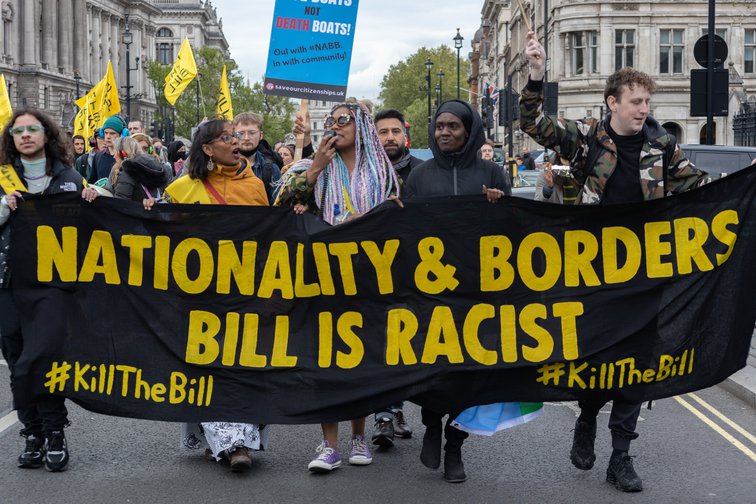How Britain’s new laws doubly criminalise Black, Asian and Gypsy people
Protesters warn of the combined threat of the Policing Bill and Nationality and Borders Bill

Activists including Chantelle Lunt and Bhavini Patel protest against the Nationality and Borders Bill
| Denise Laura Baker
Blyth Brentnall-29 April 2022
Two new British laws created this week represent a dual-pronged attack on Black, Asian and Gypsy communities in the UK, protesters have warned.
Both the Nationality and Borders (NAB) Bill, covering the UK, and the Police, Crime, Sentencing and Courts (PCSC) Bill, covering England and Wales, were given royal assent after comfortably passing through the House of Lords, despite a string of protests over the past year.
Many people fear their rights – including their British citizenship – will be endangered by the bills, which Amritpal Singh Dhesi, a member of the Sikh Council UK, described as “legislated discrimination”.
Dhesi explained: “These bills will disproportionately affect ethnic minority communities with foreign ancestry and dual citizenship compared to British Caucasian people.”
Described by the government as “the biggest overhaul” of the UK’s asylum system in decades, the borders bill includes laws relating to nationality, asylum, immigration, victims of slavery and human trafficking. Designed to “deter illegal entry into the UK”, it extends government powers to reject asylum seekers and immigrants.
It has serious consequences for many in the UK too. It extends powers to deprive dual nationals of their citizen status, which the New Statesman reported could put two in five people from non-white backgrounds in England and Wales at risk of having their citizenship stripped without warning.
The PCSC Bill, meanwhile, contains laws to severely curtail protesting rights, while criminalising some of the ways of life of Gypsy, Roma and Traveller (GRT) communities. When the government proposed the legislation last year, it used Black Lives Matter and Extinction Rebellion as examples of “highly disruptive” and “violent” groups that legitimised the bill’s creation.
The bill will prevent protests considered to cause “serious disruption” – the scope of which can be defined or redefined by the home secretary – or that have an “impact” on people nearby, including through noise. The definition of “too noisy” remains unclear. Protests near Parliament will face heightened restrictions and protesters breaking the new laws could face up to ten years in prison.
GRT communities fear the trespass laws introduced in Part 4 of the PCSC Bill will put them at risk of arrest and imprisonment simply for carrying out their traditional way of life – a move that they will now struggle to protest.
“Up and down the country I have seen how GRT people are already victims of hate crime,” said Romany Gypsy Claire Rice, the project manager of Gate Herts, which runs a platform for monitoring discrimination against her community. “Now the government has pretty much removed our right to protest, where do we go? Who do we speak to? How do we raise our voices?”
What I find at protests is that the police will immediately beeline for whichever minority person they can see
Black Lives Matter activist Chantelle Lunt, who quit her job as a police officer in 2018 over what she called “a locker room culture of casual racism and sexism”, believes the PCSC Bill is likely to disproportionately affect Black and Asian people, who already experience incommensurate levels of policing.
Black people are nine times more likely to be stopped and searched than white people, with Asian and other minority ethnic groups also disproportionately targeted. Lunt has experienced police discrimination at protests, where she says she has twice been wrongfully threatened with arrest by officers who ignored the white protesters around her.
“As a Black, female protester, I believe the bill is going to affect people like me much more,” she said. “Because what I find at protests is that the police will immediately beeline for whichever minority person they can see – be it a Black man, a Black woman, a GRT community member or someone else.”
Extinction Rebellion activist Bhavini Patel feels the two bills interlink to “entrench inequalities worse than ever”. She worries that if the PCSC Bill makes her protesting illegal, she could be at risk of being “made stateless for no reason” under the NAB Bill.
“Any association that I have with Extinction Rebellion now puts me in danger – just for holding a banner and chanting, let alone for joining a roadblock or anything like that,” she said. “However, standing up against the first steps into fascism is a duty and I draw on ancestors' courage to make these bills unenforceable.”
A Home Office spokesperson said: “The Police, Crime, Sentencing and Courts Bill will balance the fundamental right to protest with the need to swiftly deal with those who endanger and disrupt people’s lives, while also protecting communities by clamping down on unauthorised encampments.
“Similarly, the Nationality and Borders Bill will deliver the most comprehensive reform in decades to fix the broken asylum system. Clause 9 does not change any grounds on which a person can currently have their citizenship revoked.”

%20(2)%20(2)%20(1).png)
No comments:
Post a Comment
Note: only a member of this blog may post a comment.